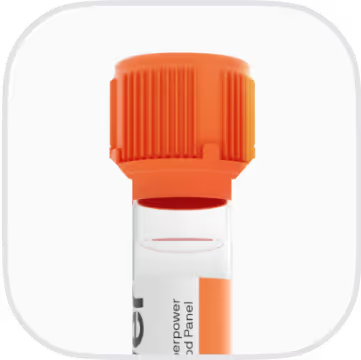What are Asthma biomarkers
Asthma biomarkers are measurable signals in your blood that mirror the inflammation inside your airways. Blood testing highlights the immune pathways that tighten and swell the bronchial tubes, helping distinguish asthma driven by allergy-type inflammation from other patterns. Key players include eosinophils (a type of white blood cell) and allergic antibodies (IgE), which rise when type 2 immune responses are active (T2 inflammation). These arise from immune cells and the airway lining and reflect the release of inflammatory messengers (cytokines such as IL‑5 and IL‑13) that promote mucus production, airway sensitivity, and flare‑ups. Additional blood proteins from the airway-epithelial response (periostin) can also signal this biology. By capturing this internal story, biomarkers make invisible airway inflammation visible—showing how “hot” the disease is, how likely symptoms or exacerbations are, and which biologic targets may be relevant. In short, asthma biomarkers translate complex airway immune activity into objective clues your clinician can use to characterize the disease and personalize care.
Why is blood testing for Asthma important?
- Confirm your asthma’s inflammation type to personalize inhaler and biologic choices.
- Spot eosinophilic asthma that responds well to inhaled steroids and biologics.
- Flag higher flare risk when eosinophils run elevated despite current therapy.
- Clarify symptoms by flagging infection-related inflammation when CRP is elevated.
- Guide biologic eligibility using eosinophil thresholds like 150–300 cells per microliter.
- Track trends to confirm control, steroid response, and relapse risk between visits.
- Explain non-asthma causes of high eosinophils, like allergies or parasites.
- Best interpreted with symptoms, FeNO, spirometry, and recent exacerbation history.
What insights will I get?
Asthma blood testing provides insight into how your immune system is functioning and how it may be influencing your overall health. Asthma is not just a lung condition—it’s a reflection of how your body manages inflammation and immune responses, which can affect energy, metabolism, cardiovascular health, and even cognitive function. At Superpower, we focus on two key biomarkers for asthma: Eosinophils and C-reactive protein (CRP).
Eosinophils are a type of white blood cell involved in allergic reactions and defense against certain infections. In asthma, eosinophils can become elevated, signaling that the immune system is reacting strongly—sometimes too strongly—to environmental triggers. CRP is a protein produced by the liver in response to inflammation anywhere in the body. While CRP is not specific to asthma, higher levels can indicate ongoing inflammation, which is often present during asthma flare-ups or poorly controlled disease.
Healthy levels of eosinophils suggest that the immune system is balanced and not overreacting, which supports stable airway function and reduces the risk of asthma symptoms. Similarly, a low CRP level indicates minimal systemic inflammation, which is associated with better respiratory health and overall stability. Together, these markers help reveal whether the body’s inflammatory and immune responses are under control, which is essential for maintaining healthy lung function in asthma.
Interpretation of these biomarkers can be influenced by factors such as recent infections, allergies, age, pregnancy, and certain medications like steroids. Laboratory methods and reference ranges may also vary, so results are best understood in the context of your overall health and medical history.







.avif)



.svg)





.svg)


.svg)


.svg)

.avif)
.svg)










.avif)
.avif)
.avif)


.avif)
.avif)




.svg)




.avif)


